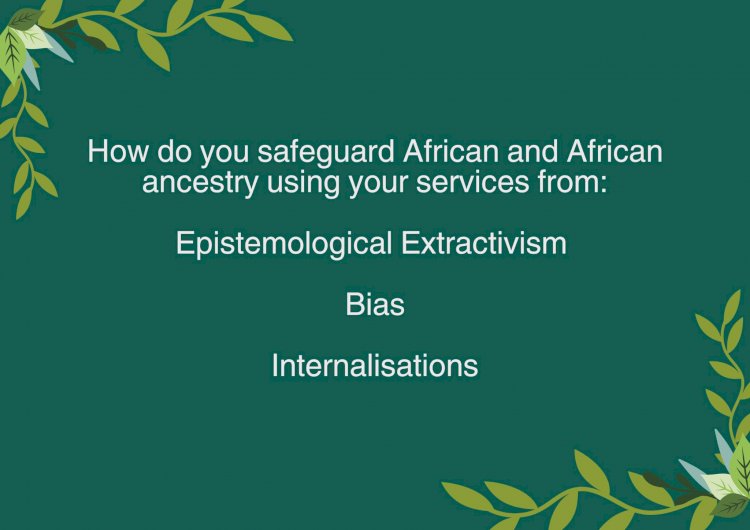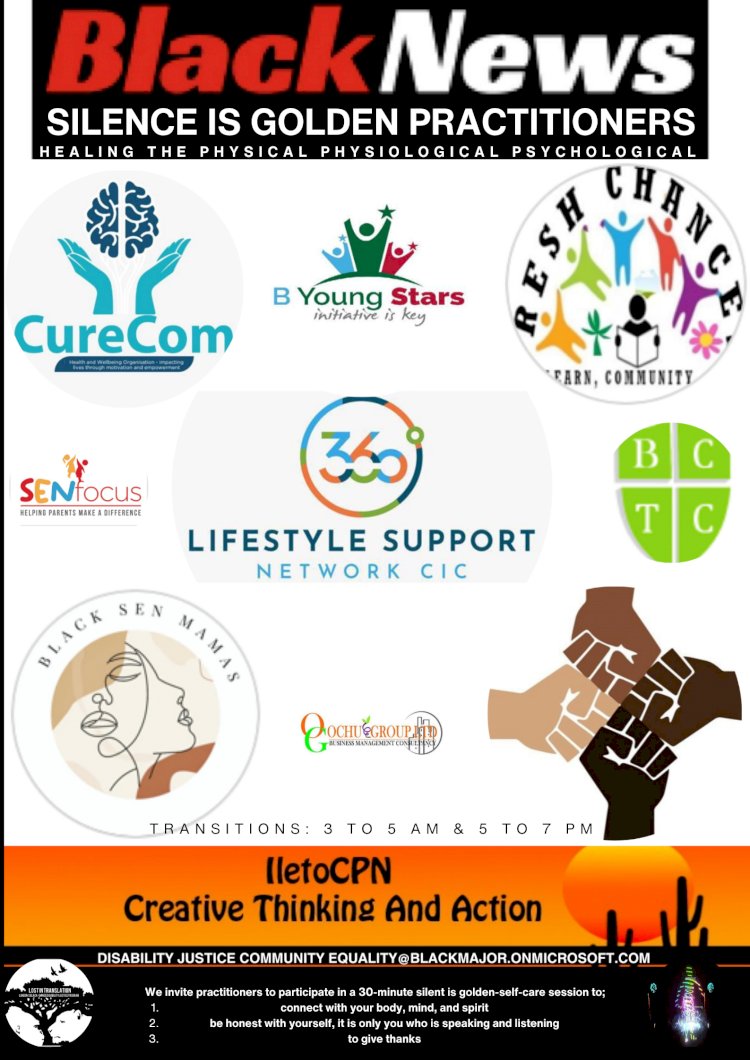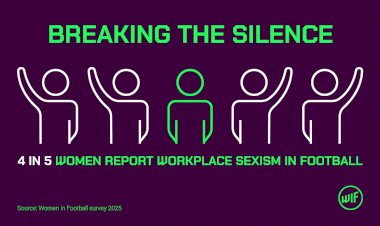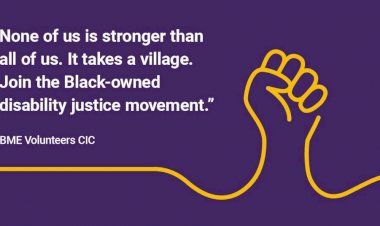Sycophants, The Disability Justice Movement And What’s Lost In Translation
“None Of Us Is Stronger Than All Of Us. It Takes A Village To Make A Difference”


“Our community agrees that promoting truth justice and fairness takes priority”

In January 2023, BME Volunteers CIC wrote to 430 UK Public Authorities. Our findings unveil that there is a distinct lack of “by and for” (Black-Owned or Black–led) provisions for African and African Caribbean People' compared to other ethnicities. As an ethnic group, we compare unfairly with regard to equitable access to adequate and appropriate public services, social spaces, and activities. Often, we are aggregated as Black or Brown to meet the equality act public sector duty by decision-makers. This often leads to feelings of loneliness and depression, which can have a significant impact on an individual's visible and invisible health.
Sycophants, The Disability Justice Movement And What’s Lost In Translation
What does it mean to you and what should it mean to the disability justice movement for change?
The word "sycophant" has its roots in ancient Greece.
It is derived from the Greek words "sukos" meaning "fig" and "phainein" meaning "to show" or "to reveal."
In ancient Greece, a "sukophantēs" referred to someone who informed the authorities about individuals illegally exporting figs, which were considered a valuable commodity.
Over time, the term evolved to describe individuals who falsely accused others or acted as informants for personal gain.
In modern usage, "sycophant" generally refers to someone who flatters or ingratiates themselves with others, often for personal advantage or to gain favour.
The Psychology of Sycophantism
The psychology of sycophantism involves understanding the underlying motivations, behaviours, and thought patterns of individuals who engage in sycophantic behaviour.
How do you safeguard the need for validation and approval?
Sycophants often have a strong desire for validation and approval from others, particularly from those they are flattering.
They seek external validation as a means to boost their self-esteem and sense of self-worth.
Can this need for validation drive systemic sycophantic behaviour?
Insecurity and low self-esteem
Sycophants may have underlying feelings of insecurity and low self-esteem.
They may believe that their own opinions and ideas are not valuable or worthy of attention, leading them to rely on the opinions and ideas of others.
Sycophantic behaviour can serve as a way to compensate for these feelings of inadequacy.
Fear of rejection and abandonment
Sycophants may fear rejection and abandonment, leading them to engage in excessive flattery and people-pleasing behaviours.
They may believe that by constantly seeking approval and catering to the needs of others, they can avoid being rejected or abandoned. This fear can drive their sycophantic tendencies.
Lack of assertiveness and boundary-setting
Sycophants often struggle with assertiveness and setting boundaries.
They may have difficulty expressing their own opinions or asserting their needs and preferences.
Instead, they prioritise the desires and opinions of others, even at the expense of their own well-being.
This lack of assertiveness can contribute to their sycophantic behaviour.
Cognitive dissonance
Sycophants may experience cognitive dissonance, which is the discomfort that arises when there is a conflict between their own beliefs and the beliefs of the person they are flattering.
To reduce this discomfort, they may adopt the beliefs and opinions of the person they are flattering, even if they contradict their own values or beliefs.
This cognitive dissonance can reinforce their sycophantic behaviour.
Social and power dynamics
Sycophantic behaviour often occurs within social and power dynamics.
Sycophants may engage in flattery and subservient behaviours to gain favour, access opportunities, or maintain relationships with individuals who hold positions of power or influence.
They may believe that aligning themselves with powerful individuals will benefit them in some way.
Understanding the psychology of sycophantism can help shed light on the underlying motivations and dynamics at play.
It is important to approach individuals who engage in sycophantic behaviours with empathy and understanding, recognising that their behaviours may stem from deep-seated insecurities and a need for validation.
Bias And The Sycophant
Confirmation bias
Sycophants may have a strong inclination to seek out information and opinions that align with the beliefs and preferences of the person they are flattering.
They may actively ignore or dismiss information that contradicts or challenges those beliefs.
This confirmation bias can lead to a distorted view of reality and hinder critical thinking.
Authority bias
Sycophants often place a high value on the opinions and beliefs of authority figures.
They may be more likely to accept and adopt the views of these individuals without question, even if they are biased or unsupported by evidence.
This bias can prevent sycophants from critically evaluating information and forming their own independent opinions.
In-group bias
Sycophants may develop a strong bias towards the group or individual they are flattering.
They may prioritise the interests and perspectives of this group over others, leading to a lack of objectivity and fairness.
This bias can hinder their ability to consider alternative viewpoints and engage in constructive dialogue.
Emotional bias
Sycophants may be driven by a desire for validation and acceptance from the person they are flattering.
This emotional attachment can cloud their judgment and lead to biased decision-making. They may be more inclined to support and defend the person's actions and beliefs, even if they are objectively flawed or unethical.
What is the impact when Sycophants rely heavily on the opinions and ideas of others, without questioning or evaluating them for themselves?
Epistemological extractives in this context refers to the tendency of sycophants to extract knowledge and beliefs from others without engaging in critical thinking or independent exploration.
What are the implications?
Lack of critical thinking
Sycophants may fail to engage in critical thinking and analysis of the knowledge they receive.
Instead of questioning and evaluating the information, they simply accept it as truth without considering alternative perspectives or evidence.
This can lead to a shallow understanding of complex issues and hinder intellectual growth.
Blind acceptance of authority
Because sycophants often place a high value on the opinions and beliefs of authority figures, they may unquestioningly accept and adopt these beliefs without considering their own values or experiences.
This blind acceptance can lead to a lack of independent thought and a reliance on external sources for knowledge and guidance.
Limited perspective
By relying solely on the knowledge and beliefs of others, sycophants may limit their exposure to diverse perspectives and ideas.
This can result in a narrow worldview and a lack of understanding of different cultures, beliefs, and experiences.
It hinders their ability to develop empathy and engage in meaningful dialogue with others.
Inauthentic internalisations
Sycophants may internalise beliefs and values that are not genuinely aligned with their own experiences and convictions. Instead of developing their own unique perspective, they adopt the beliefs of others without critical evaluation. This can lead to a lack of authenticity and a disconnection from their true selves.
How can we overcome the limitations of epistemological extractivism?
Sycophants can take several steps
Cultivate critical thinking skills
Engage in independent research, analysis, and evaluation of information.
Question assumptions, seek out diverse perspectives, and develop the ability to think critically about the knowledge you encounter.
Seek a variety of sources
Expand your sources of information beyond a single authority figure or group.
Seek out diverse perspectives, engage in dialogue with people who hold different beliefs, and expose yourself to a range of ideas and experiences.
Reflect on personal values and experiences
Take the time to reflect on your own values, beliefs, and experiences. Consider how they align with the knowledge you encounter and evaluate whether they resonate with your authentic self.
Embrace intellectual humility
Recognise that knowledge is a continuous process of learning and growth.
Be open to revising your beliefs and opinions based on new information and evidence.
Embrace intellectual humility by acknowledging that you don't have all the answers and that there is always more to learn.
By actively engaging in critical thinking, seeking diverse perspectives, and reflecting on personal values, sycophants can overcome the limitations of epistemological extractivism.
Listen to your inner self during transition hours!
In our view, this may allow for a more authentic and intellectually fulfilling approach to knowledge acquisition and personal growth.
Impact on progress from sycophantism
Sycophantism, the act of seeking favour or approval from those in power, can have a significant impact on progress within any movement, including the disability justice movement.
Dilution of Goals
Sycophants often prioritise their own personal gain or the approval of those in power over the movement's goals and values.
This can lead to a dilution of the movement's core principles and a shift in focus towards superficial or performative actions.
As a result, the movement may lose sight of its original objectives and fail to address the systemic issues that need to be addressed.
Lack of Authenticity
Sycophants may engage in actions or rhetoric that are not genuine or authentic.
This lack of authenticity can undermine the credibility of the movement and make it difficult to build trust and solidarity with African and African Ancestry Neurodivergent and Disabled communities.
When the movement is seen as insincere or opportunistic, it becomes harder to mobilise support and effect meaningful change.
Exclusion of Marginalised Voices
Sycophants often prioritise the interests and perspectives of those in power, neglecting the voices and experiences of marginalised individuals.
This exclusion can perpetuate existing power imbalances and prevent the movement from addressing the specific needs and concerns of those most affected by the issues at hand.
Without the inclusion of diverse voices, progress is limited, and the movement fails to achieve its full potential.
Resistance to Change
Sycophants may resist or undermine efforts to challenge the status quo or disrupt existing power structures. They may be more inclined to maintain the current power dynamics, as it benefits their own personal interests. This resistance to change can impede progress and prevent the movement from achieving meaningful and lasting impact.
Loss of Grassroots Support
Sycophantism can alienate grassroots activists and community members who are genuinely committed to the cause.
When the movement is perceived as being co-opted by sycophants, grassroots support may wane, leading to a loss of momentum and a decrease in the movement's ability to effect change.
In order to mitigate the impact of sycophantism on progress, it is crucial for the disability justice movement to remain vigilant and actively challenge sycophantic behaviours.
This can be achieved through fostering a culture of accountability, promoting transparency, and prioritising the voices and needs of marginalised individuals.
By centering the experiences of those most affected by the issues at hand and maintaining a commitment to authenticity and inclusivity, the movement can overcome the obstacles posed by sycophantism and continue to make meaningful progress towards disability justice.
While sycophantism generally has negative implications for progress within a movement, it is important to acknowledge that there may be some perceived benefits associated with sycophants.
However, it is crucial to critically examine these potential benefits and consider the long-term consequences they may have on the movement.
Here are a few potential benefits that could be attributed to sycophants:
Insecure Access to Resources
Sycophants may have the ability to gain access to resources, connections, and opportunities that can be beneficial for the movement.
Their proximity to those in power may provide them with the means to secure funding, partnerships, or platforms that can amplify the movement's message.
However, it is important to question whether these resources come at the expense of compromising the movement's values or diluting its goals.
Influence and Visibility
Sycophants may have the ability to gain influence and visibility within mainstream spaces or institutions.
This can potentially provide a platform to raise awareness about the movement's cause and reach a wider audience.
However, it is crucial to consider whether this influence and visibility are being used authentically and in alignment with the movement's principles, or if they are being used to further personal interests or maintain the status quo.
Allyship Networking and Collaboration
Sycophants may have the ability to network and collaborate with influential individuals or organisations.
This can potentially lead to partnerships and alliances that can strengthen the movement's impact and reach.
However, it is important to critically assess whether these collaborations are based on shared values and a genuine commitment to the movement's goals, or if they are driven by personal gain or the desire for validation from those in power.
It is important to note that these potential benefits should be examined with caution, as they can often come at the expense of the movement's authenticity, inclusivity, and long-term goals.
Sycophants may prioritise personal gain or the approval of those in power over the needs and voices of marginalised communities.
In the pursuit of progress, it is crucial to prioritise the empowerment and inclusion of those most affected by the issues at hand and to challenge sycophantic behaviours that may hinder the movement's ability to bring about meaningful and lasting change.
Sycophants and colonialism
Sycophants and colonialism have a complex relationship, as sycophantic behaviour can both perpetuate and be influenced by colonial power dynamics.
Colonialism, characterised by the domination and exploitation of colonised peoples by colonial powers, created a system of hierarchies and power imbalances that continue to shape civil societies today.
Sycophants, individuals who seek favour and approval from those in power, often reinforce and benefit from these power structures.
During the colonial era, sycophants played a significant role in facilitating and maintaining colonial rule. They would align themselves with colonial powers, often adopting the cultural norms, values, and language of the colonisers, in order to gain favour and access to resources.
By ingratiating themselves with the colonial authorities, sycophants would often be rewarded with positions of authority or influence within the colonial administration.
This allowed them to further their own interests and maintain their privileged status within the colonial system.
Sycophantic behaviour within the context of colonialism can be seen as a form of collaboration with the oppressor and perpetrator.
By aligning themselves with the colonial and perpetrator powers, sycophants would often betray the interests and aspirations of their own communities.
They would actively participate in the subjugation and exploitation of their fellow countrymen, perpetuating the colonial power dynamics and reinforcing the marginalisation of their own people.
Furthermore, sycophantic behaviours can also be influenced by the internalised oppression that results from colonialism.
The colonial project often sought to erase or devalue indigenous cultures, languages, and traditions, promoting the superiority of the colonisers' culture.
This created a sense of inferiority among some colonised peoples, leading some individuals to adopt sycophantic behaviours as a means of seeking validation and acceptance from the colonisers.
By mimicking the values and behaviours of the colonisers, sycophants hoped to distance themselves from their own culture and gain recognition within the colonial and perpetrator power structure.
However, it is important to note that not all individuals who engaged in sycophantic behaviours during the colonial era did so willingly or out of self-interest.
Many were coerced or forced into collaboration due to the oppressive nature of colonial rule. The power dynamics of colonialism often left individuals with limited choices, and sycophantic behaviours may have been a survival strategy for some.
It seems sycophantic behaviours and colonialism are intertwined, as sycophants often perpetuate and benefit from colonial power dynamics.
By aligning themselves with the colonisers and perpetrators, sycophants reinforce the marginalisation, victimisation, and exploitation of their own communities.
However, it is important to recognise that sycophantic behaviours can also be influenced by the internalised oppression resulting from colonialism.
Raising awareness of and even trying to understand the complex relationship between sycophants and colonialism is necessary for challenging and dismantling the power structures that continue to perpetuate inequality and injustice today – Neo-Colonialism.
“I” conscientiousness versus “We” conscientiousness
Do you agree that sycophants are often driven by selfish motives, as their behaviours are primarily focused on seeking personal gain, validation, or approval from those in power?
If actions are typically driven by a desire to advance my own interests, rather than genuinely advocating for the greater good or the needs of marginalised communities.
If I prioritise my own well-being and personal advancement above the collective goals of a movement or community.
Am I engaging in flattery, manipulation, or other forms of ingratiation to gain favour with those in power, often at the expense of others?
Is this I-conscientiousness, and can this approach hinder progress and undermine the authenticity and integrity of a movement?
By seeking validation and approval from those in power, sycophants may compromise their own values and principles.
They may be willing to overlook or downplay injustices, inequalities, or systemic issues in order to maintain their privileged position or gain personal benefits.
These self-serving behaviours can perpetuate existing power imbalances and hinder efforts to address ethnic, climate, social, economic, and political injustices.
Moreover, sycophantic behaviours can create divisions within a movement or community.
By prioritising personal gain and seeking favour from those in power, sycophants may undermine allyship, solidarity and collaboration among activists.
This can lead to a breakdown in trust and cooperation, ultimately hindering the collective efforts to bring about meaningful change.
It is important to consider whether or not all individuals who engage in sycophantic behaviours are inherently selfish or malicious.
Some may be driven by a genuine desire to make a difference but have succumbed to the pressures of seeking validation or approval.
However, it is crucial to recognise and challenge the selfish tendencies that can arise from sycophantic behaviours in order to foster a more inclusive, authentic, and effective advocacy approach.
In your view, if you accept that sycophants are often motivated by selfishness, prioritising personal gain and validation over the collective goals and needs of a movement or community.
That their behaviours can hinder progress, compromise values, create divisions, and perpetuate existing power imbalances.
What are your suggestions on how we address and challenge sycophantic tendencies in order to foster a more selfless, inclusive, and impactful approach to advocacy and social change?
What is Lost in Translation in the Disability Justice Movement because of the impact Sycophants have on African and African Ancestry Neurodivergent and Disabled Peoples?
Recap
African and African ancestry communities have long been subjected to various forms of oppression and marginalisation.
In recent years, the disability justice movement has emerged as a powerful force advocating for the rights and inclusion of individuals with disabilities.
However, within this movement, the presence of sycophants may have resulted in the subsequent loss in translation of the movement's goals and values.
It has hindered progress and perpetuated systemic inequalities.
Has ignorance of the presence of sycophants within the disability justice movement resulted in the dilution of its core principles and the erasure of the unique experiences faced by African African ancestry individuals?
Erasure of Intersectionality
Sycophants often fail to acknowledge the intersectionality of identities within the African and African ancestry communities.
This erasure leads to a lack of understanding and support for the unique challenges faced by individuals who experience both racial discrimination and disability.
For instance, a sycophantic approach may overlook the specific barriers faced by African and African Ancestry men with disabilities, such as limited access to healthcare, education, and employment opportunities.
Superficial Representation
Sycophants may engage in performative acts of representation without truly understanding the experiences and needs of African and African ancestry individuals with disabilities.
This superficial representation can perpetuate harmful stereotypes and reinforce existing power dynamics.
For example, a sycophantic portrayal of disability along with Western concepts of witchcraft as it pertains to African communities may focus solely on epistemological extractivism, neglecting the diverse range of oppressive tools simultaneously applied and the importance of challenging.
The marginalisation of Authentic Voices
Sycophants often overshadow and marginalise the voices of African and African ancestry and individuals with disabilities, perpetuating a power imbalance within the movement.
By prioritising their own agendas and perspectives, sycophants silence those who have firsthand experiences of the challenges faced by their communities.
This exclusionary practice hinders progress and prevents the movement from addressing the specific needs of African and African ancestry Neurodivergent and Disabled individuals.
Our thoughts
The impact of sycophants on African and African ancestry communities within the disability justice movement cannot and should not be underestimated.
Their presence leads to the erasure of intersectionality, superficial representation, and the marginalisation of authentic voices.
To truly advance the cause of disability justice, it is crucial to prioritise the inclusion and empowerment of African and African ancestry individuals with disabilities.
By amplifying their voices, acknowledging their unique experiences, and addressing the systemic barriers they face, the disability justice movement can work towards a more equitable and inclusive society for all.

Ubuntu
As you may be aware, Ubuntu is a concept rooted in African philosophy that emphasises the interconnectedness and interdependence of all individuals within a community.
It promotes the idea that one's humanity is tied to the well-being and dignity of others and that we are all responsible for each other's welfare.
In the context of sycophants, their behaviours often contradict the principles of Ubuntu
Sycophants, by seeking personal gain and validation from those in power, prioritise their own interests over the collective well-being of the community.
Their actions are often driven by self-centered motives rather than a genuine concern for the welfare of others.
This goes against the spirit of Ubuntu, which encourages individuals to act in ways that promote the common good and uplift the entire community.
Furthermore, sycophantic behaviours can undermine the principles of equality and justice that are central to Ubuntu.
By seeking favour from those in power, sycophants may perpetuate existing power imbalances and contribute to the marginalisation of certain individuals or groups within the community.
This contradicts the Ubuntu principle of recognising and valuing the inherent worth and dignity of all individuals.
In contrast, Ubuntu encourages empathy, compassion, and solidarity.
It calls for individuals to recognise and respect the humanity of others, and to actively work towards the well-being and flourishing of the entire community.
Ubuntu promotes a sense of shared responsibility and collective action, which stands in stark contrast to the self-serving nature of sycophantic behaviours.
To uphold the principles of Ubuntu, it is important to challenge and address sycophantic tendencies.
This can be done by fostering a culture of accountability, promoting transparency, and prioritising the voices and needs of marginalised individuals within the community.
By embracing the spirit of Ubuntu, we can create a more inclusive, equitable, and compassionate society that values the well-being of all its members.
Reflections
In order to cultivate a healthy sense of self-esteem, it is important to focus on developing genuine self-worth rather than seeking validation from others.
This can be achieved through silent self-reflection, self-acceptance, setting realistic goals, and cultivating intergenerational strength (not trauma).
Self-reflection during transition hours (3 am to 5 am and 5 pm to 7 pm) allows individuals to gain a deeper understanding of their own strengths, weaknesses, and values.
By taking the time to reflect on our own thoughts, feelings, and experiences, we can develop a clearer sense of self and what truly matters.
This self-awareness forms the foundation for building genuine self-worth, as it allows individuals to recognise and appreciate their own unique qualities and contributions.
Self-acceptance is another crucial aspect of developing genuine self-worth.
It involves embracing oneself, flaws, and all, and recognising that no one is perfect.
By accepting and embracing their imperfections, individuals can free themselves from the need for constant validation and approval from others.
This self-acceptance allows individuals to develop a more compassionate and forgiving attitude towards themselves, which in turn boosts their self-esteem.
Setting realistic goals is also important in building genuine self-worth. By setting goals that are aligned with one's values and interests, individuals can experience a sense of purpose and accomplishment.
These goals should be challenging yet attainable, allowing individuals to push themselves and grow while also experiencing a sense of achievement.
By focusing on their own personal growth and progress, individuals can develop a sense of self-worth that is not dependent on the opinions or validation of others.
While sycophantic behaviours may provide a temporary boost to one's self-esteem through external validation, it ultimately undermines genuine self-worth and personal growth.
Cultivating a healthy sense of self-esteem requires focusing on developing genuine self-worth through self-reflection, self-acceptance, and setting realistic goals. By doing so, individuals can build a strong foundation of self-worth that is not reliant on the opinions or validation of others, leading to a more fulfilling and authentic sense of self.

Call To Action
“None Of Us Is Stronger Than All Of Us. It Takes A Village To Make A Difference”

Help Us Improve The Quality Of Accessibility, Inclusion And Diversity:
- Decolonise Truth, Fairness, Justice, and Empathy: prioritise as core values, as our community consider prerequisites for unlearning and essential to providing decolonised movement and justice for all individuals and communities. Our hub allows practitioners and advocates to come together to better understand the needs and experiences of those we serve, and to provide tailored collective support, resources, and a learning environment.
- Inclusivity: Applied and Measurable Inclusivity is another important core value for our community, as we works with diverse communities and individuals. By prioritising inclusivity, we try to ensure that all individuals feel welcome and valued, and that their unique needs and experiences are taken into account.
- Integrity: Integrity is a crucial core value for our community. We enjoy honesty, transparency, and ethical behaviour in all interactions and operations that impact, involve or concern us.
- Collaboration: Collaboration is essential to achieving our goals, as the movement works with individuals, groups, communities, and other stakeholders. By prioritising collaboration and co-production, the movement can build strong partnerships and work together to achieve shared goals.
- Respect: Respect is another important core value for us, as it is essential to building strong relationships with individuals and communities. By prioritising respect, we ensure that all individuals are treated with dignity and that their voices are heard and fairly valued.
- Innovation: Innovation is important, but particularly for decolonising education, healing, and justice. We prioritise innovation in order to find new and creative ways to support individuals and communities, and to address complex social issues.
- Accountability: Accountability is essential, but particularly in education, healing, and justice. We prioritise accountability in order to hold ourselves to account and to contribute to the movement and deliver high-quality services.
8. Empowerment: Empowerment is a crucial core value, as we work to support individuals and communities in achieving their goals and overcoming challenges. By prioritising empowerment, the movement can help individuals and communities to build their own capacity and to take control of their own lives and futures.

























